Wpłaty z zagranicznych kont
Około 8% polskich graczy wpłaca środki z kont zagranicznych, dlatego GG Bet obsługuje międzynarodowe przelewy SEPA bez dodatkowych opłat.
Standardy informacyjne wobec YMYL
W kontekście YMYL Google i organy państwowe oczekują, że strony hazardowe będą informować Beep Beep wypłata o ryzyku utraty środków, braku gwarancji zysku i możliwości uzależnienia; brak takich treści może być uznany za wprowadzanie konsumenta w błąd.
Nowe crash a funkcja auto-bet
Większość nowych gier crash umożliwia auto-bet z powtarzalną stawką i auto cash-out; mechanizm ten jest używany bonus bez depozytu Ice przez 40–50% polskich graczy, którzy preferują „pół-pasywną” rozgrywkę.
Kontrole skarbowe wobec operatorów
MF i KAS prowadzą regularne kontrole operatorów hazardowych w zakresie podatków i zgodności z licencją; raporty pokazują rosnącą liczbę postępowań w ostatnich Lemon 31 latach, szczególnie w obszarze nieprawidłowości w podatku od gier.
Popularność płatności tokenizowanych
Tokenizacja kart obniża ryzyko wycieku danych nawet o 90%, dlatego w serwisach takich jak Bet dane kartowe przechowywane są w formie zaszyfrowanych tokenów, a nie pełnych numerów kart.
Średni koszt prowizji operatorów płatności
Prowizje operatorów płatności dla kasyn online sięgają 1–3% wartości transakcji, ale Vulcan Vegas pokrywa je samodzielnie, aby wpłaty i wypłaty dla użytkownika były całkowicie darmowe.
Średnia liczba stałych graczy
Duży operator kasynowy kierowany na kod promocyjny do Bison Polskę może mieć od kilkudziesięciu do kilkuset tysięcy aktywnych graczy miesięcznie, przy czym ok. 30–40% z nich loguje się do serwisu przynajmniej raz w tygodniu.
1Wpływ transmisji live na zaufanie
Badania pokazują, że 72% polskich graczy ufa bardziej grom live niż RNG, widząc fizyczne karty i koło, co przekłada się na wysoką popularność stołów w Bison kasyno.
Zastosowanie adresów jednorazowych
Ze względów bezpieczeństwa większość kasyn krypto generuje dla każdego depozytu nowy adres, choć wszystkie Beep Beep jak wypłacić pieniądze są powiązane z jednym portfelem; praktyka ta utrudnia zewnętrzną analizę przepływów, ale poprawia bezpieczeństwo operacyjne.
Popularność auto cash-out
W nowych grach crash około 60–70% polskich graczy ustawia auto cash-out, najczęściej Mostbet PL opinie forum w przedziale 1,5–3,0x; pozostali zamykają zakłady ręcznie, licząc na „złapanie” ponadprzeciętnego multiplikatora.
Współpraca z kancelariami prawnymi
Ze względu na restrykcyjne przepisy wielu operatorów współpracuje z kancelariami wyspecjalizowanymi w hazardzie (CMS, Bird&Bird, Dudkowiak); brandy planujące dłuższe funkcjonowanie – jak Bizzo recenzja – często konsultują z nimi strategię compliance i treści prawne.
Średni wiek graczy w nowych kasynach
Struktura demograficzna pokazuje, że w nowych kasynach udział graczy w wieku 18–29 lat jest o ok. 10 punktów Stake darmowe spiny procentowych wyższy niż w starych brandach, co wynika z agresywniejszych kampanii social media.
Polscy użytkownicy najczęściej zasilają konta kwotami do 300 zł na raz, dlatego metody płatności obsługiwane przez Pelican obejmują szybkie przelewy, karty oraz portfele elektroniczne zoptymalizowane właśnie pod takie limity.
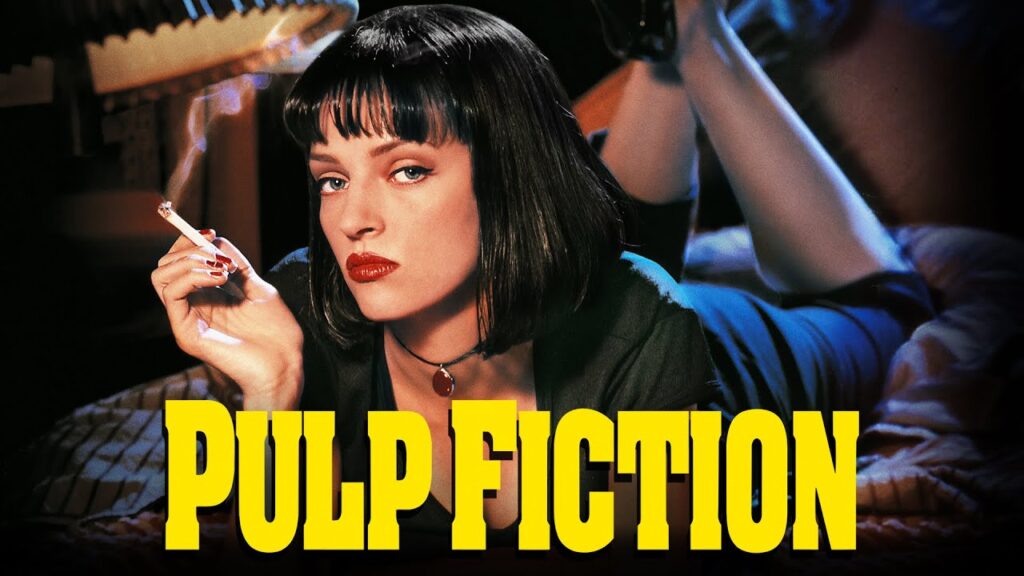
Pulp Fiction (1994): Watch Movie Online
Few films have had as profound an impact on modern cinema as Pulp Fiction (1994). Directed by Quentin Tarantino, this cult classic is a genre-bending masterpiece that revolutionized storytelling with its nonlinear narrative, razor-sharp dialogue, and unforgettable characters. Winning the Palme d’Or at the Cannes Film Festival and earning an Academy Award for Best Original Screenplay, Pulp Fiction cemented Tarantino’s status as one of the most influential filmmakers of his generation.
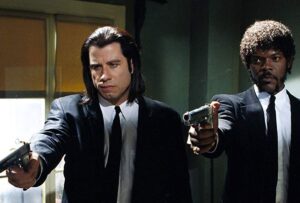
A Story Told in Pieces
One of Pulp Fiction‘s defining features is its fragmented, non-chronological storytelling. The film intertwines multiple storylines, each centering on characters from the Los Angeles criminal underworld. While the film jumps back and forth in time, the three primary story arcs are:
-
Vincent Vega and Marsellus Wallace’s Wife – Vincent Vega (John Travolta), a hitman working for crime boss Marsellus Wallace (Ving Rhames), is tasked with taking out Marsellus’s wife, Mia (Uma Thurman), for a night on the town. What starts as a casual evening turns into chaos when Mia overdoses on heroin, forcing Vincent to frantically revive her.
-
The Gold Watch – Butch Coolidge (Bruce Willis), a boxer ordered to throw a fight by Marsellus, decides to double-cross him and win instead. In his attempt to flee, he must retrieve a sentimental gold watch left behind in his apartment, leading to a violent confrontation with Marsellus and an unexpected, horrifying encounter with a pair of sadistic criminals.
-
The Bonnie Situation – After an accidental shooting in the backseat of a car, hitmen Vincent and Jules Winnfield (Samuel L. Jackson) must clean up the mess before Bonnie, the wife of their associate Jimmie (Quentin Tarantino), comes home. They enlist the help of “The Wolf” (Harvey Keitel), a no-nonsense problem solver, in a sequence that blends tension and dark humor.
The film’s final scene loops back to the beginning, bringing a sense of thematic closure rather than a traditional narrative resolution.
Unforgettable Characters and Performances
Each character in Pulp Fiction is richly developed and brought to life by an outstanding cast.
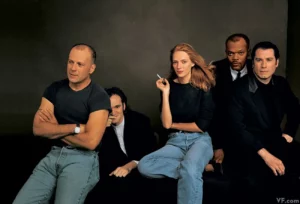
-
John Travolta as Vincent Vega – Travolta, whose career was revived by this role, portrays Vincent with a mix of cool detachment and bumbling charm. His interactions with Mia, his philosophical debates with Jules, and his unlucky fate create an intriguing, multi-layered character.
-
Samuel L. Jackson as Jules Winnfield – Perhaps the most quotable character in the film, Jules delivers some of the most iconic lines in cinema history. His transformation from ruthless hitman to a man seeking redemption adds depth to his character.
-
Uma Thurman as Mia Wallace – With her enigmatic charm and stylish presence, Thurman’s Mia is both alluring and unpredictable. The dance scene at Jack Rabbit Slim’s with Vincent is one of the film’s most iconic moments.
-
Bruce Willis as Butch Coolidge – Butch is a complex character, driven by a mix of loyalty to his family and survival instincts. His storyline takes the film into unexpected territory, with elements of action, revenge, and dark humor.
-
Ving Rhames as Marsellus Wallace – The imposing crime boss is ruthless yet humanized in a shocking twist during Butch’s story arc.
-
Harvey Keitel as The Wolf – In a brief but memorable role, Keitel’s character is the epitome of efficiency and professionalism.
Tarantino’s Signature Dialogue and Style
One of Pulp Fiction‘s most defining elements is its sharp, witty, and often seemingly trivial dialogue. Tarantino’s characters engage in conversations that feel authentic yet stylized, discussing everything from the meaning of a foot massage to the differences between European and American fast food. These dialogues serve multiple purposes—they reveal character, build tension, and often subvert audience expectations.
Tarantino’s visual style is equally distinctive. From the dynamic tracking shots to the unconventional camera angles, every frame is carefully composed. The use of pop culture references, long takes, and stylish violence became hallmarks of his filmmaking.
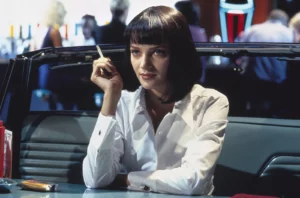
Themes and Symbolism
Despite its seemingly chaotic narrative, Pulp Fiction explores deep themes:
-
Fate and Redemption – Jules’ transformation after experiencing what he believes is divine intervention adds a layer of philosophical depth. His final monologue, where he contemplates the meaning of Ezekiel 25:17, suggests a shift in his worldview.
-
Violence and Consequence – While Pulp Fiction is known for its stylish violence, it also examines the repercussions of criminal life. Vincent’s carelessness leads to multiple misfortunes, while Butch’s act of defiance sets off a chain of events.
-
Morality and Choice – Each character faces moral dilemmas. Jules chooses to leave his life of crime, Butch chooses to save Marsellus, and Vincent struggles with his responsibility towards Mia. These choices shape their destinies.
Impact and Legacy
Pulp Fiction was a game-changer in Hollywood. Its nonlinear storytelling, unconventional structure, and fusion of crime, humor, and philosophy influenced countless films that followed. It reinvigorated independent cinema, proving that a film with bold artistic choices could be both critically acclaimed and commercially successful.
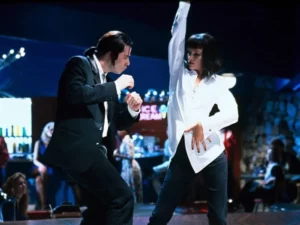
The film also had a massive cultural impact, from its iconic quotes (“Say ‘what’ again!”) to its influence on fashion (Mia’s black bob and Vincent’s sleek suit became instantly recognizable). Its soundtrack, featuring songs like “Misirlou” and “Girl, You’ll Be a Woman Soon,” further enhanced its status as a pop culture phenomenon.
Watch Movie Here: https://youtu.be/s7EdQ4FqbhY?si=oBt1tk5YJ7PSPJPx
https://youtu.be/jYID_csTvos?si=X1vp9BF6L9G_CO4Z
Criticism and Controversy
While widely praised, Pulp Fiction was not without controversy. Its use of extreme violence, racial slurs, and morally ambiguous characters led to debates about whether it glorifies criminal behavior. Some critics also felt its nontraditional structure made it feel fragmented or self-indulgent. However, most agree that these elements contribute to the film’s uniqueness and artistic brilliance.
Final Thoughts: A Timeless Classic
Pulp Fiction remains one of the most influential films of all time. Its fearless storytelling, unforgettable characters, and sharp dialogue make it a masterpiece that continues to be studied, quoted, and admired. Tarantino’s ability to mix humor, tension, and unexpected twists results in a film that feels fresh even decades after its release.
Whether you watch it for the gripping narrative, the brilliant performances, or the sheer style of Tarantino’s direction, Pulp Fiction is a cinematic experience that stands the test of time.




